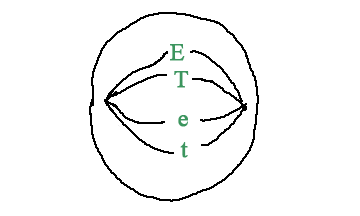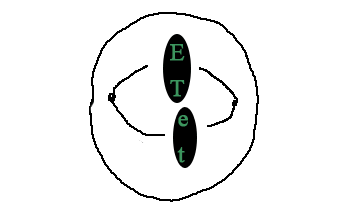But what if the genes are linked?
A key assumption of the Punnett Square you just did is that the alleles for the two genes are independent. In other words, what kind of teeth the kid gets doesn't affect what kind of eyes he gets. The reason for this is that we're assuming that the two genes are on different chromosones. During meiosis, the two chromosomes split up, and either chromosome can end up in each gamete. So, for a double hybrid (EeTt), you can get any combination for the gametes ...
Notice that I am not showing chromosomes or chromatids below. It's really hard to put all of the biological detail into the movie and still make it understandable. So I gave up. Anyway, I'm a math teacher, not a biologist (well, actually I am a biologist too, but not a genetics teacher) so you'll have to look up the details of meiosis in your textbook.
| ET and et happen this way: | while Et and eT happen this way : | 
|

|
What if we violate this assumption? That is, we find out that smiley's two characteristics are both on the same chromosome? Smiley is STILL a double hybrid, but now specific alleles are linked together. For example, our guy might have both dominant alleles on one copy of the chromosome, and both recessive on the other copy. (A different guy, call him frowny, might have a different arrangment). For Smiley, only TWO kinds of gametes are now possible, not the four kinds above:
| ET and et would happen this way: |

|
Copyright University of Maryland, 2007
You may link to this site for educational purposes.
Please do not copy without permission
requests/questions/feedback email: mathbench@umd.edu